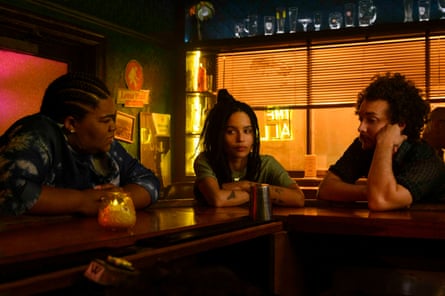Rob Brooks, the star of Hulu’s reimagining of High Fidelity, is a difficult protagonist to have sympathy for. She is, first of all, played by Zoë Kravitz, daughter of Lenny Kravitz and an actor of effortless cool. She dresses in thoughtless yet perfect thrifted outfits, owns a (seemingly successful) record shop employing her two best friends, has a spacious Brooklyn apartment filled with vinyls and a usable bathtub, and can easily school anyone’s music knowledge while slinging back whiskey neats. She has, in other words, all the enviable panache of a rockstar child; her biggest concern is her fixation with the man who dumped her a year prior, yet High Fidelity tries – and tries very hard, sometimes entertainingly – to make you feel her romantic miscalculations are an all-consuming, relatable pain.
The result is a show which is sometimes grating yet sneakily beguiling, in the way that beautiful, curated messiness can be. The Hulu show re-envisions the 2000 movie – itself an adaptation of a 1995 Nick Hornby novel set in 1980s London – in which John Cusack plays a self-absorbed record store owner relitigating his romantic past to get over an ex. This version switches Chicago for Crown Heights (and a little Williamsburg), and the Everyman Cusack for ethereal Kravitz, it keeps Rob’s fourth-wall breaks, through which to dismiss someone or something, and a plan to revisit past heartbreaks to explain how she’s alone by age 30. The gender flip smartly reorients the music of the movie; now, a black, queer woman (one of Rob’s top five ex-lovers is a woman) dictates the terms of taste and asserts the vibe, even if her pop culture awareness is almost entirely music-centric (a series-long bit involves Rob talking about but never actually watching The Sopranos, a choice to ignore a television touchstone that feels pointed and also very much something I have done).
The show also extends the length, perhaps to its detriment; over 10 half-hour episodes, Rob stews over her ex-fiance Mac (Kingsley Ben-Adir), who dumped her a year ago and recently moved back to the city. She copes by hashing out theoretical top five lists (top five desert island artists, top five all-time heartbreaks) with her employees/best friends Simon (David H Holmes) and Cherise (a scene-stealing Da’Vine Joy Randolph), and half-hearted relationships with men she reduces to cliches – a hot musician (Thomas Doherty, in a role originally played by Kravitz’s mother, Lisa Bonet) and Nice Guy With A Prius Clyde (Jake Lacy). Her pity party – nights out at the bar where she used to DJ, nights in smoking to old records – is soundtracked by an omnivorous, too-cool playlist (the Roots’ Questlove serves as musical consultant).
Kravitz is an able actor who shines in Rob’s moments of genuine conflict, but is miscast for a role as a relatable everywoman whose self-pity is supposed to anchor a five-hour show; it’s hard to take her seriously when she saunters down the street saying “New York is full of people who make you feel not enough” or proclaims she’s always dreamed of dating a musician. It would be one thing if the show was in on the joke, if Rob’s judgments of other’s stability or style or music taste as uncool were flipped or turned back on her. Instead, the show largely feeds into her sense of superiority – an influencer clique is, as she confides to the viewer, annoying and basic, an old acquaintance she uses for a night out is tiring, and she isn’t proven wrong.

Spending five hours in Rob’s world is exhausting, but it’s also compelling, in part because of, unfortunately, the natural intrigue of an artful mess, but largely due to a great supporting cast – Randolph gives a depth of insecurity and creative fear to Cherise’s no-fucks-given attitude, while a capsule episode covering Simon’s top five heartbreaks (his first serious boyfriend, a charming yet untrustworthy lawyer) does more to explain the toxic lure of self-destructive love than Rob’s hours of “I’m an asshole” soliloquies.
There’s hope that Rob’s self-imposed misery will sputter out into a form of resolution, revelation or genuine insight – something the structure of 10 half-hour episodes with ample asides allows her to escape too often. Rob’s asshole tendencies – abandoning others, coldness, flippancy – aren’t so much explored in this series as justified by her own sense of complicatedness, of interesting-ness. At one point in her past-heartbreak tour, she attends a dinner party at a lush Brooklyn apartment, during which an influencer-type asks her to take a photo. “Does it look real?” the woman asks, posing with a can. “Does it look fucked up and vibey?”
Rob clearly views this performed cool with disdain, but it reads like the show’s underlying questions spoken aloud. Does this depiction of life in 2019 Brooklyn – the sterile neon-lit cafes and expensive coffee, the banter with the friendly bodega man (a perfect example of what Willy Staley recently termed “bodega fetishism”) – look real? Does Rob’s heartbreak look real? Do they also look fucked up, in a vibey, safely titillating way? Rob’s suffering looks as though it could be framed for a fashion campaign – vignettes of near-tears, angsty cigarettes puffs and the sallow look of just-smudged mascara. It would be nice if the pain of mid-20s regrets looked this good. Which is to say, High Fidelity often seems familiar, and sometimes fucked up, definitely vibey. That’s a solid hook for viewers, but most won’t mistake it as real.
High Fidelity launches on Hulu on 14 February and in the UK at a later date

Comments (…)
Sign in or create your Guardian account to join the discussion